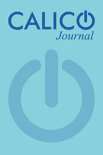
CALICO Journal
Scope & Guideline
Exploring New Frontiers in Language Learning and Technology.
Introduction
Aims and Scopes
- Technology-Enhanced Language Learning:
The journal emphasizes the integration of technology in language education, exploring how digital tools can facilitate language learning and teaching. - Research in CALL Methodologies:
It promotes research on various methodologies utilized in CALL, including empirical studies, theoretical frameworks, and practical applications in language classrooms. - Multimodal and Digital Literacy:
The journal explores how multimodal approaches and digital literacy skills impact language acquisition and pedagogy. - Teacher Development in Digital Contexts:
CALICO Journal places importance on the professional development of language educators in relation to technology, examining how teachers adapt to and integrate digital tools in their instruction. - Community and Collaborative Learning:
The journal also investigates the role of social media and online communities in fostering collaborative learning environments for language learners.
Trending and Emerging
- Virtual and Augmented Reality in Language Learning:
There is a growing trend towards the exploration of virtual and augmented reality applications in language learning, indicating a shift towards immersive learning experiences. - Social Media as a Learning Tool:
Research focusing on the use of social media platforms for language learning has increased, highlighting their role in connecting learners with authentic language communities. - Blended and Online Learning Frameworks:
There is a notable rise in studies addressing blended and online learning frameworks, particularly in response to the COVID-19 pandemic and the resulting changes in teaching practices. - Multimodal Learning and Digital Storytelling:
Emerging themes include the use of multimodal learning strategies and digital storytelling projects, which emphasize creativity and engagement in language learning. - Data-Driven Learning and Assessment:
The focus on data-driven approaches to learning and assessment is trending, reflecting a growing interest in utilizing analytics and technology to enhance educational outcomes.
Declining or Waning
- Traditional Language Teaching Methods:
There is a noticeable decrease in research related to traditional language teaching methods, as the focus has shifted towards more innovative, technology-driven approaches. - Physical Classroom Dynamics:
Research exploring the dynamics of physical classroom interactions has waned, likely due to the increasing emphasis on online and blended learning environments. - Static Assessment Models:
There is a declining interest in static assessment models, as more studies are focusing on dynamic and formative assessment methods that leverage technology. - Printed Resources and Textbooks:
The use of printed resources and textbooks in language learning has decreased in exploration, with more emphasis now placed on digital resources and interactive learning tools.
Similar Journals

LANGUAGE LEARNING & TECHNOLOGY
Transforming Language Learning in the Digital AgeLANGUAGE LEARNING & TECHNOLOGY, published by the University of Hawaii's National Foreign Language Resource Center, stands as a pioneering platform within the realms of linguistics, education, and computer science applications. With an impressive impact factor and esteemed rankings—achieving Q1 in Education and Q1 in Linguistics and Language—this open-access journal has been disseminating critical research since its inception in 1997. The journal operates under a commitment to fostering innovative approaches to language learning through technology, making it invaluable for researchers, educators, and practitioners seeking to enhance their understanding of this dynamic intersection. Hailing from the United States, the journal not only promotes scholarly dialogue but also champions accessibility to knowledge, ensuring that the latest advancements in language learning and technology are readily available to a global audience. With converged years documented from 1997 to 1998 and from 2000 to 2021, LANGUAGE LEARNING & TECHNOLOGY continues to play a pivotal role in shaping contemporary discussions around language education and the influence of technology on learning methodologies.

ALSIC-Apprentissage des Langues et Systems d Information et de Communication
Connecting Scholars to Enhance Language Education Worldwide.ALSIC-Apprentissage des Langues et Systems d Information et de Communication, published by ADALSIC, is a premier Open Access journal that has been at the forefront of language learning and information and communication systems since its inception in 1998. With its ISSN 1286-4986, this journal provides a crucial platform for researchers, educators, and practitioners to share innovative findings and pedagogical practices in the interdisciplinary fields of linguistics, education, and technology. The journal invites contributions that explore the dynamics of language acquisition, the effectiveness of communication systems, and the integration of technology in learning processes. By maintaining an Open Access policy, ALSIC ensures that its valuable research is accessible to a global audience, promoting collaboration and knowledge sharing among scholars and professionals dedicated to enhancing language education and communication methodologies. As an inclusive journal based in Strasbourg, France, it plays a vital role in shaping current discourse and advancing research in its field.

Porta Linguarum
Connecting theory and practice in language education.Porta Linguarum, published by UNIV GRANADA in Spain, is a pioneering journal dedicated to the fields of linguistics and language studies, with a dual focus on the educational implications and applications within these disciplines. Launched in 2008 and continuing its impactful contributions into 2024, the journal is recognized for its rigorous peer-reviewed articles that address contemporary language issues, pedagogical approaches, and linguistic research, evidenced by its notable rankings in the 2023 Scopus metrics. Porta Linguarum holds a distinguished Q1 classification in Linguistics and Language, alongside a respectable Q3 placement in Education, marking it as a valuable resource for academics and practitioners alike. With an impressive ranking of 231 out of 1088 in the Arts and Humanities category and a strong 78th percentile ranking for Language and Linguistics, this journal facilitates the exchange of innovative ideas and promotes scholarly discourse. Although currently not adopting an open access model, it remains an essential platform for advancing knowledge in linguistics and education.

Language Learning in Higher Education
Fostering scholarly dialogue on language pedagogy.Language Learning in Higher Education is a prominent academic journal published by DE GRUYTER MOUTON, dedicated to exploring the intricate dynamics of language acquisition and pedagogical practices within the higher education context. With a robust ISSN: 2191-611X and E-ISSN: 2191-6128, this journal provides a platform for innovative research that addresses contemporary challenges and methodologies in language education. The journal enjoys a favorable reputation in the academic community, as evidenced by its ranks in the Scopus database, where it holds a position in the 67th percentile for Language and Linguistics and is classified in the Q3 and Q2 quartiles across relevant education and linguistics categories. Since its convergence in 2017, Language Learning in Higher Education aims to enrich scholarly discourse by publishing high-quality articles that foster insights into effective language learning strategies, thus serving as an essential resource for researchers, educators, and students committed to enhancing language education. The journal's editorial team is devoted to advancing the field through rigorous peer-review processes and welcomes contributions that push the boundaries of language learning research.
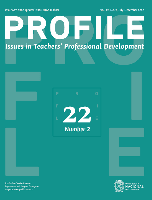
Profile-Issues in Teachers Professional Development
Advancing Educators: Exploring the Landscape of Professional GrowthProfile - Issues in Teachers Professional Development is a distinguished open access journal published by the Universidad Nacional de Colombia, Facultad Ciencias Humanas, aimed at fostering research and discourse surrounding critical issues in educators' ongoing professional development. Since its inception in 2005, the journal has established itself as a significant resource within the fields of Education and Linguistics and Language, reflecting its relevance through its category quartiles, being positioned in Q3 in Education and an impressive Q1 in Linguistics and Language for 2023. The journal boasts a commendable Scopus ranking, reflecting its impact and commitment to advancing scholarly discussion, with rankings of #236 out of 1167 in Linguistics and Language, and #818 out of 1543 in Education. With a converged timeline from 2018 to 2024, it serves as a vital platform for educators, researchers, and students alike, encouraging the dissemination of innovative practices and insights essential for the evolution of teacher training and professional growth in a rapidly changing educational landscape.
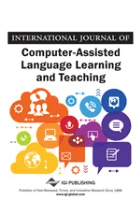
International Journal of Computer-Assisted Language Learning and Teaching
Empowering educators with cutting-edge research.Welcome to the International Journal of Computer-Assisted Language Learning and Teaching, a premier publication by IGI Global dedicated to advancing the interdisciplinary research at the intersection of linguistics, education, and computer science. With an ISSN of 2155-7098 and an E-ISSN of 2155-7101, this journal aims to provide a platform for innovative studies on the implementation and effectiveness of technology in language learning and teaching. The journal has earned notable recognition within its field, securing a Q1 ranking in Linguistics and Language and strong placements across several categories in the 2023 Scopus Ranks, including a Q3 classification in Computer Science Applications and Computer Vision and Pattern Recognition. Researchers and educators are encouraged to contribute their findings to foster dialogue around effective computer-assisted methodologies and instructional practices. Although the journal is not open access, it remains a vital resource for researchers, professionals, and students seeking to enhance the efficacy of language education through technological innovation.
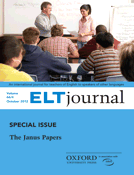
ELT Journal
Exploring Innovations in English Language TeachingELT Journal, published by Oxford University Press, is a premier academic journal dedicated to the fields of Educational Psychology, Linguistics, and Language, boasting an esteemed Q1 category ranking across these disciplines. Since its inception in 1946, the journal has served as a vital platform for researchers and educators, offering insights into English Language Teaching (ELT) and the evolving pedagogical practices that influence language acquisition and literacy development. With an impressive Scopus ranking placing it in the 95th percentile within the Arts and Humanities (Linguistics and Language), ELT Journal not only contributes to academic discourse but also bridges theoretical frameworks with practical applications in educational settings. Although it does not currently offer Open Access, the journal remains essential for professionals and students alike, eager to stay abreast of the latest research trends and innovations in the global ELT landscape. For those committed to advancing their understanding of language education, the journal's diverse range of articles and case studies provide invaluable resources.
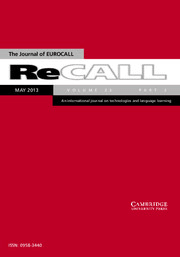
ReCALL
Advancing Research at the Intersection of Language and InnovationReCALL is a prestigious academic journal published by Cambridge University Press, focusing on the rapidly evolving interplay between technology and language learning. Established in 1989, this quarterly journal holds a distinguished Q1 ranking across multiple categories including Computer Science Applications, Education, and Linguistics and Language, reflecting its commitment to the highest standards of scholarly excellence. With an impressive Scopus ranking that places it in the top percentiles across its fields, ReCALL serves as a vital resource for researchers, educators, and professionals interested in the integration of technology in language education. It features cutting-edge research articles, innovative methodological approaches, and comprehensive reviews that offer insights into the current trends and future directions of language learning, teaching, and assessment. By providing a platform for penetrating inquiry and dialogue, ReCALL significantly enhances the discourse surrounding computer-assisted language learning (CALL) and its influence on educational practices worldwide.

Studies in Self-Access Learning Journal
Facilitating dialogue in self-access learning practices.Studies in Self-Access Learning Journal is a pioneering academic outlet dedicated to the exploration and advancement of self-access learning practices across diverse educational contexts. Published by Kanda University of International Studies in Japan, this open access journal has been committed to disseminating high-quality research since its inception in 2010, facilitating global access to valuable insights in the fields of Computer Science Applications, Education, and Linguistics and Language. With a significant presence in academic databases, the journal has achieved notable rankings, including Q3 in both Computer Science Applications and Education, and Q2 in Linguistics and Language for 2023. Its emphasis on innovative practices in self-directed learning makes it an essential resource for researchers, educators, and practitioners alike, who are looking to contribute to and benefit from the latest findings in this dynamic area of study. As the journal continues to evolve through its converged years from 2019 to 2024, it remains a vital forum for scholarly dialogue, encouraging multidisciplinary collaborations and enriching the educational landscape.
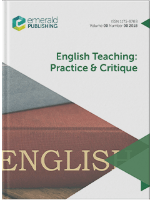
English Teaching-Practice and Critique
Bridging Theory and Practice in English Language TeachingEnglish Teaching-Practice and Critique is an esteemed journal published by Emerald Group Publishing Ltd, focusing on the interdisciplinary fields of Education and Linguistics. With a commitment to advancing knowledge and practice in English language teaching, the journal offers a platform for innovative research, critical reflections, and practical insights that are vital for educators, researchers, and students alike. The journal has established itself in the academic community, achieving a Q3 ranking in Education and a prestigious Q1 ranking in Linguistics and Language as of 2023, highlighting its impact and relevance. Although not an open-access journal, its curated content remains accessible to a global audience, facilitating meaningful discourse and development in English language education. The journal spans articles from 2008 to 2014 and 2016 to 2024, making it a valuable resource for ongoing scholarly dialogue and pedagogical advancement. It is particularly recognized within Scopus rankings, standing at the 76th percentile in Arts and Humanities as well as the 74th percentile in Social Sciences, underscoring its significance and standing in these domains.